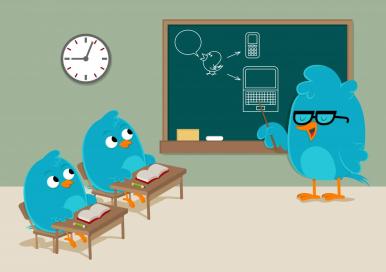The use of social media in the educational field is manifold; this video gives an introduction to 21st Century Education. It’s focused on Australian education but has many interesting facts: for example in South Korea they have digital textbooks, which register the amount of hours spent reading them online!
There is arguably little debate about the benefits of the Internet in education. So what about social media? When I was in sixth form, my friends’ geography teacher set up a Twitter account to share relevant, geography-related media. He was ‘@geographreak’ or something similar… It caused quite a stir since he was the first teacher to really engage with pupils on social media in this way. It worked though! Although I personally didn’t study with him, I remember my friends talking about the discussions they would have in class about the links he’d shared on Twitter. This video also suggests other beneficial ways social media can be used in the classroom. Furthermore, education world reveals that a scientific study discovered that “students learn most effectively when they interact with other learners”. I do believe this to be true, and think that by creating a hash tag for an educational topic (like #UOSM2033!) on Twitter, more students would be encouraged to form and voice their own opinions when they see their peers interacting with the topic online. What’s more, social media is ‘cool’ so students are more likely to be attracted to and participate in it.
It obviously has its benefits, but where’s the boundary? I also witnessed first-hand the crossing of this boundary in school. A new teacher, fresh out of university, would tweet his pupils to notify them of classroom changes, but he’d also tweet older students about meeting at the pub. The school found out and he was subsequently sacked for this ‘inappropriate’ relationship. This isn’t a unique case; cases of teachers being sacked as a result of their social media activity are very prevalent in the media. It’s an ethical minefield. Many schools worldwide, such as this one in America, have been debating ethical codes of conduct to set the boundaries, with the media also giving great attention to the necessity of social media guidelines for teachers.
Personally, I don’t agree with those who suggest that teachers and pupils shouldn’t engage on social media at all. There needs to be some conduct, and yes- tweeting students to meet them at the pub is perhaps too far. As long as things stay educational and professional, I think teachers should definitely use social media in, and for, the classroom: it allows a level of engagement that I think is more attractive and beneficial for millennial learners.


Hi Hannah,
I also think teachers and students should use social media to improve learning. I came across this study: http://www.gla.ac.uk/media/media_276225_en.pdf
which stated that 68% of students said social media enhanced their learning experience and also 75% found it very helpful. Interestingly none of the students said the experience was not helpful.
There will always be those who are abusers of the system and I think there should be clearer guidelines to what is and what isn’t appropriate. I further researched into guidelines and came across this: http://www.edutopia.org/blog/guidebook-social-media-in-classroom-vicki-davis
I particularly liked idea number 1, 3 and 6. I like the idea of getting parents involved so they can see what exactly is going on in their child’s classroom. What are your favourites from that list?
Hollie
LikeLike
Hey Hannah,
I do agree that using social media in a classroom setting and having teachers interacting with students across various online platforms has its advantages. As you’ve mentioned your experience in sixth form, I too, before taking this class, have had teachers who have made it an effort to interact with us online which made it easier to clarify queries and doubts, and not only that, but be given supplementary material to whatever was covered in class via social media.
You’ve said that you believe that there should be a code of conduct to prevent any blunders such as inappropriate behaviour and misuse of these platforms. Do you think then it would be a better idea for learning institutions to make social media interaction a part of curriculum and then be able to control what teachers put out onto the internet? Or do you think that by doing, it takes away from the more interactive nature of social media as everything would have to be looked over before it’s allowed to be posted?
LikeLike